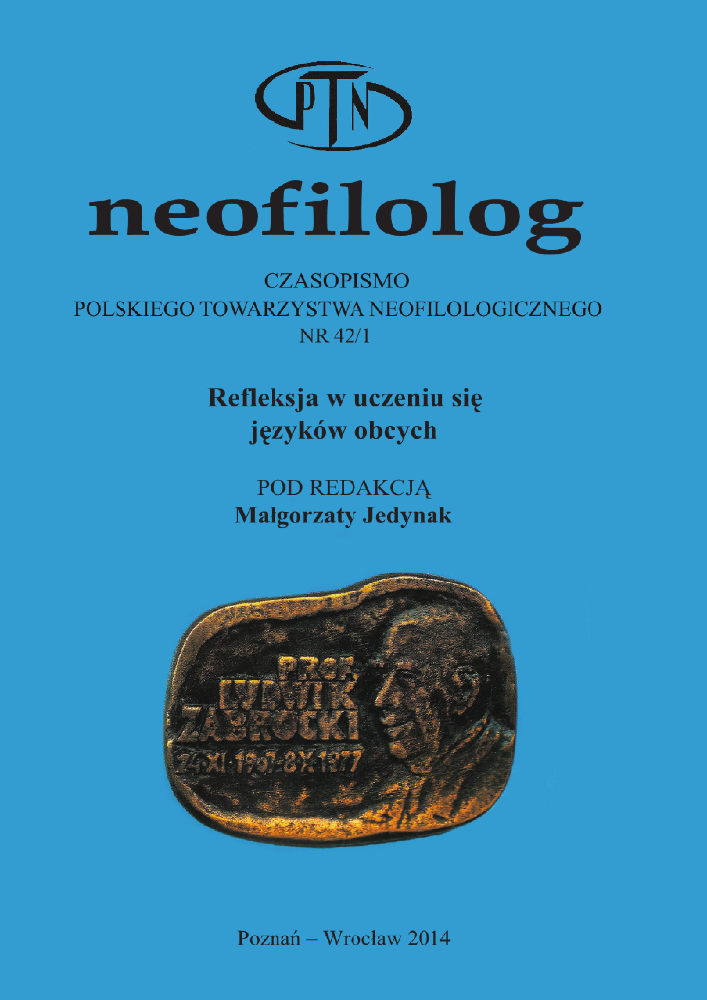Abstract
This paper reports on some of the data from a large-scale study Teaching and Learning Foreign Language in lower secondary school, which began in the school year 2011-12 and traces selected groups of learners through the three years of Key Stage 3 (gimnazjum), ending in school year 2013-14. The study was conceived and is managed by the Foreign Language Section of the Educational Research Institute (ERI) in Warsaw with European funding. (see Acknowledgement). In this article the focus is on data obtained from interviews conducted with learners from class one of 120 lower secondary schools, where the students were asked to describe and give opinions about learning English in their school and to imagine an ideal lesson. The learners are the reason that lessons in school take place, but their views are rarely consulted. This study attempts to redress the balance.References
Bragg, S., 2007. Consulting young people: a review of the literature London: Creative Partnerships.
Cook-Sather, A, 2002. "Authorising students’ perspectives: toward trust, dialogue, and change in education". Educational Researcher. 31/4: 3-14.
Czerniawski, G and Kidd, W. 2011. The Student Voice Handbook: Bridging the aca-demic/practitioner divide. Bingley: Emerald Group Publishing.
Czyż, E. (n.d.) Prawa ucznia w szkole. Warszawa: Helsińska Fundacja Praw Człowieka. Retrieved from htp://www.bezuprzedzen.org/doc/Prawa_ucznia_w_szkole_HFPCz.pdf on 30.09.2013.
Flutter,J. and Ruddock, J. 2004. Consulting pupils: What’s in it for schools? London: Routledge Falmer.
Kozol, J. 1991. Savage inequalities: Children in America’s schools. New York: Harper Perennial.
Ministerstwo Edukacji Narodowej. 1992. Zarządzenie nr. 14 z dnia 19.06.1992 w sprawie ramowych statutów szkół publicznych.
Ministerstwo Edukacji Narodowej. 2009. Postawa Programowa z komentarzami. Języki Obce.
Oldfather, P. 1995. “Songs “come back most to them”: Students’ experiences as Researchers”. Theory into Practice, 43 (2):131-137.
Rudd, T., Colligan, F., and Naik, R., 2007. Learner Voice: A Handbook. Bristol: Future-lab. Ruddock, J. 2004. Pupil voice is here to stay! Retrieved from http://www.serviceschoolsmobilitytoolkit.com/resourcedownloads/staffroom/bpv_theneedtoinvolvepupilvoice.pdf on 30.09.2013
Ruddock, J. and Flutter, J. 2004. How to improve your school: giving pupils a voice, London: Continuum.
Strucker, M., Moise, L. N., Magee, and V. L., Kreider, H. 2001. “Writing the wrong: Making schools better for girls” (w:) In our own words: Students’ perspectives on school. J. Shultz i A. Cook-Sather (red.) Lanham, MD: Rowman & Littlefield: 149-164.
License
Copyright (c) 2019 Neofilolog

This work is licensed under a Creative Commons Attribution-NoDerivatives 4.0 International License.
Authors
Authors of texts accepted for publication in Neofilolog are required to complete, sign and return to the Editorial team’s office the Agreement for granting a royalty-free license to works with a commitment to grant a CC sub-license.
Under the agreement, the authors of the texts published in Neofilolog grant Adam Mickiewicz University in Poznań a non-exclusive, royalty-free license and authorize the use of Attribution-NoDerivatives 4.0 International (CC BY-ND 4.0) Creative Commons sub-license.
The authors retain the right to the free disposal of the work.
Users
Interested Internet users are entitled to use works that have been published in Neofilolog since 2017, under the following conditions:
▪ attribution – obligation to provide, together with the distributed work, information about the authorship, title, source (link to the original work, DOI) and the license itself.
▪ no derivatives – the work must be preserved in its original form. Without the author's consent, it is not possible to distribute the modified work in the form of translations, publications, etc.
Copyrights are reserved for all texts published since 2017.
Miscellaneous
Adam Mickiewicz University in Poznań retains the property right as a whole (layout, graphic form, title, cover design, logo etc.).
